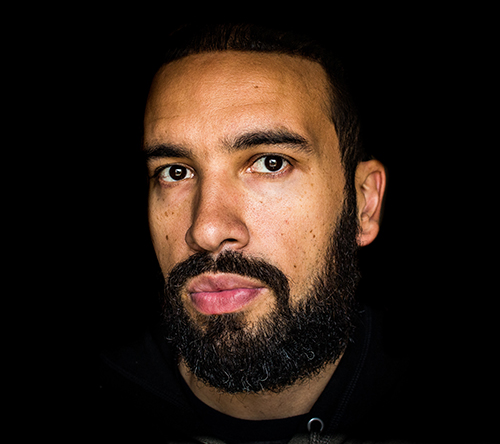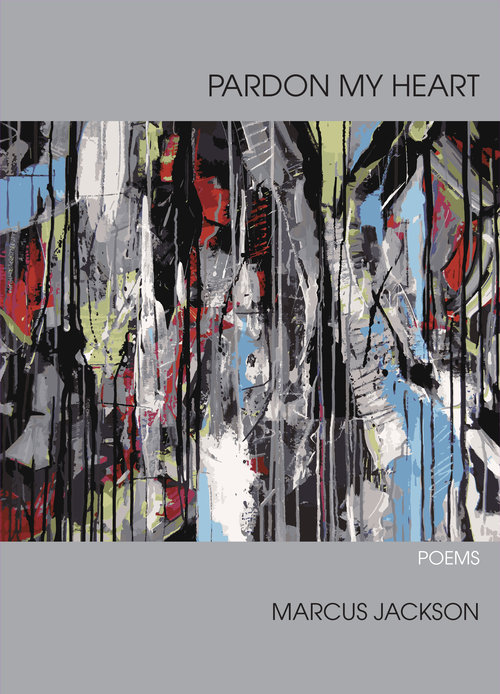An Urban Voice
Alumnus Marcus Jackson interprets a world both personal and public
By Laurie B. Davis
Navigating a city street, his mind may slightly wander as his feet move with purpose from point A to point B. He absorbs the sensory experience surrounding him — the sights, the smells and sounds he might encounter when stepping off a curb in a throng of pedestrians, passing over a graffitied bridge or briefly loitering at a merchant’s window. It is in these public, and yet private, moments that Marcus Jackson (A/S ’03) gathers the salient details and raw material for his poetry.
What stands out, says Jackson, is “any architectural detail, any street sign that’s weird, any piece of graffiti I haven’t seen before, an expression on a stranger’s face when I’m walking by that sort of gives me a portal into what they’re going through, what their life might be like. All of those things could start a draft or a sentence, and I write them down in a journal.”
Jackson became attuned to urban life in New York City as a graduate student at New York University. He had earned a dual degree in communication and English at The University of Toledo, then took a year off to polish his writing before enrolling in NYU’s MFA program. There, he studied with some of his favorite creative writers.
“NYU really challenged me, made me a better poet and let me be around some of the best writers in the world,” Jackson says. “I can’t put a value on that. The city itself put the finishing touches on my adulthood and made me the kind of person who I am artistically and professionally,” says Jackson.
Some of the poets who helped him shape his work were Philip Levine, Sharon Olds, Kimiko Hahn, Ed Hirsch, Susan Wheeler and Phillis Levin. “I can still go back to their books and be like, wow, I’m seeing brand new things in these poems,” says Jackson.
One professor at UToledo who continues to influence Jackson is poet Timothy Geiger, professor of English and proprietor of the Aureole Press. Aureole published Jackson’s first chapbook of poetry, “Rundown.” Jackson says UToledo can be an ideal university for many students. “It’s affordable, but the faculty across the board, at least in my experience, was top notch — both in the communication side and the English side,” says Jackson. “I came across a bunch of really talented professors who were also generous and humble. It was a great fit for me.”
Twenty-five lines to 25 pages
When Jackson lays down the language of his poetry across an urban landscape, he may also tell a quick story or paint a character portrait. He says he hopes to “invite the reader toward proximity to where they can then fully enter” a poem. As students in our Western culture, Jackson says, “we’re so conditioned to trust the paragraph and dive into prose. Generally, when we come across a poem on the page, we’re like, ‘what’s this weird thing?’ It’s kind of the same way with visual art when we walk into a museum of modern art: This is kind of edgy, I don’t know if I’m going to get this. That happens with poems for a lot of people,” he adds.
In 2008, The New Yorker Magazine published Jackson’s poem, “Mary at the Tattoo Shop.” For Jackson, that provided validation for the kind of poems he wanted to create. Besides his chapbook, Jackson has two other published books of poetry, “Neighborhood Register” and “Pardon My Heart,” which the New York Times reviewed.
He says his current project breaks away from the short, 25-line poems in “Pardon My Heart.” “I’m working on probably the most baffling thing I’ve ever worked on poetically,” says Jackson, who is writing a really long poem. “I’m shooting for 25 pages or more. It’s generally about the disappointments, the strangeness and the feelings of being overwhelmed that happen on an individual level and a societal level when professional and cultural expectations are broken. I’m pretty confused and having lots of fun with it; it’s a good summer project.”
Jackson, an assistant professor of English, who teaches creative writing at The Ohio State University, has some advice for young alumni. “There’s no formula or road map for finding your way professionally or finding your way artistically or philosophically after college and grad school. A lot of it is improv, and just hustle and luck. Hopefully you can find a couple of people who can point you in the right direction.”
Marcus Jackson lives in Columbus, Ohio, with his wife, Nicole, a psychologist at the VA Central Ohio Healthcare System, and their 5-year-old daughter, Lenox.









